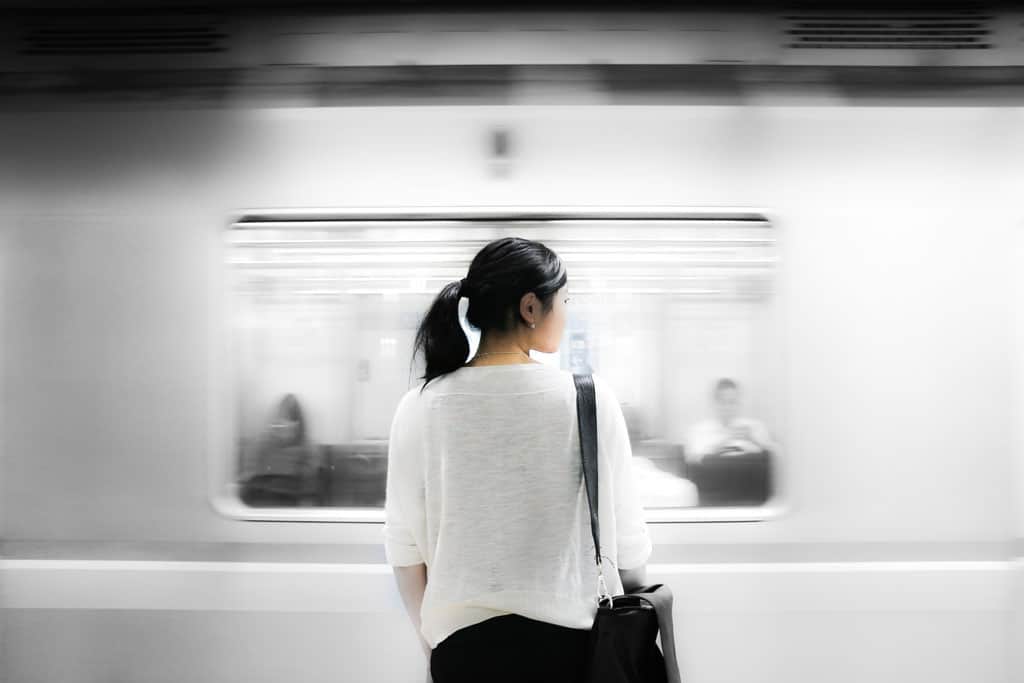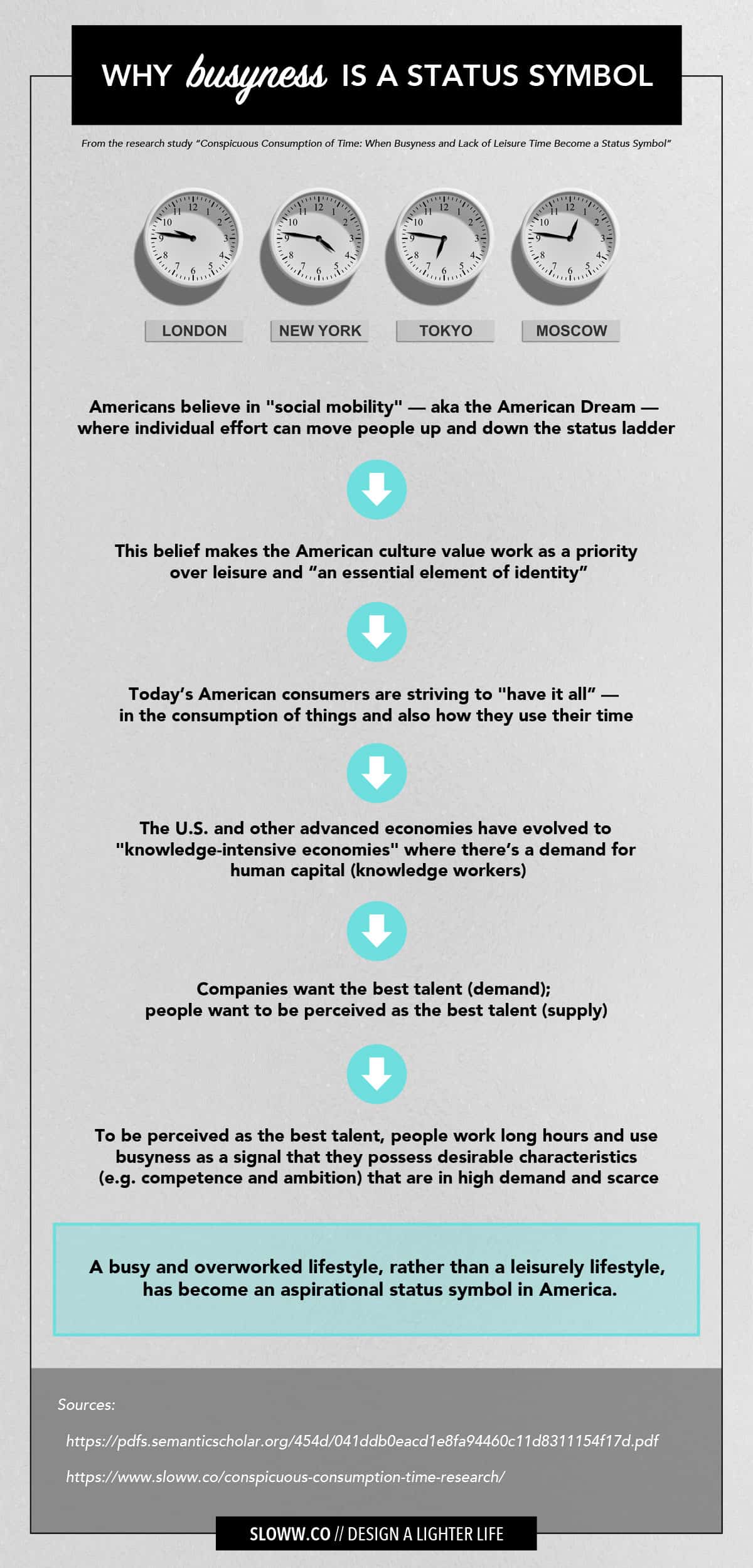
Yesterday’s post summarized an important piece of busyness research: “Conspicuous Consumption of Time: When Busyness and Lack of Leisure Time Become a Status Symbol”
Today, I’ll distill the research a bit further and also include some additional color commentary from one of the research authors, Silvia Bellezza (Columbia Business School).
Acknowledging that we are busy is one thing. Developing an awareness and understanding as to why we are busy gets to the root causes of busyness.
Why Busyness is a Status Symbol—Quick Summary of Busyness Research Conspicuous Consumption of Time

What countries actually get work-life balance right?
The original research study looked at Americans and Italians. Silvia says:
- “I actually think that the two cultures we picked, neither actually gets the formula right in terms of happiness while also having an economy that’s functional and working well. (Americans) Working all the time is dysfunctional and becoming a workaholic society is not healthy. On the other hand, it’s also true that if you see how seriously Italians take their holidays, the country’s basically paralyzed for two months…I don’t think that’s healthy either. As I worked on this paper I actually became more and more convinced that the countries that have the formula the most right in terms of balancing work and leisure are probably Denmark or the Netherlands, because those countries have a very high number of paid holidays and people really care about what they do, where they go in the summer, but on the other hand, their productivity per hour is very high. It’s probably a mix of the legal system protecting the right to holidays and an attitude toward work which is very healthy.”¹
I’ll be taking a closer look at Denmark and the Netherlands more in the future. These countries also consistently rank near the top of the World Happiness Report. I’d like to better understand the universal and cultural (likely non-geographic) things that we can all apply to better our lives no matter where we live.
How did status signaling shift from things to time?
Silvia explains further:
- “When I say I’m busy, I convey status not through what I’m wearing but by signaling that I’m something that’s very scarce. I’m communicating that I’m high status because of the intrinsic value of myself and my human capital. It’s a more sophisticated and nuanced strategy than signaling through products. It’s about our intelligence and our inner-characteristics.”²
As people have become wealthier, access to luxury things has increased—that means they can’t signal status as effectively these days:
- “(Thorstein) Veblen (in 1899) was the first to say that spending a lot of money on products should operate as a signal of status. But I think generally the reason why we observe the rise of these alternative signals of status has to do with the fact that on the one hand, the population is wealthier, so there’s more access to luxury goods. And on the other hand, there’s mass production of these goods, so compared to when Veblen was writing, many more people have access, say, to Louis Vuitton bags or Rolex watches. This increased access should mean that these signals of status cannot operate as strongly as they did in the past. So something else has to come up and become a different signal. Basically I’m very interested in the question: What is this new thing that comes up?”¹
If busyness is the current status symbol, what’s the next status symbol in the future?
Busyness as a status symbol isn’t just affecting work. It’s creeping into life as well—think of people opting for experiences over things and FOMO (Fear Of Missing Out). They are cramming every moment of their free time with as many experiences as possible:
- “The consumption of free time is increasingly ‘harried’ and characterized by an acceleration of the pace at which leisure is enjoyed.”³
The health impacts of 24/7 busyness are starting to catch up with us as well:
- “It is interesting that people find the busy lifestyle so aspirational and associate it with status given that the downsides of this lifestyle are often acknowledged and discussed (e.g., the negative impact on happiness, wellbeing, and health).”
The glorification of busy will (hopefully) come to an end when people get “sick and tired of being sick and tired” and/or busyness becomes so common that it’s no longer aspirational. The latter is already starting:
- “Of course, the more people brag about how busy they are, the more common it becomes, and as that happens, particularly in workaholic cultures, status symbols, just like fashions, are likely to change…It becomes mainstream…For signals of status to operate, they need to be visible and they need to be costly. And visibility is compromised if everyone else is doing it too.”4
- “In Silicon Valley, apparently, I’ve heard that actually it’s not very fashionable to show that you’re working all the time, even if you are. So maybe there, just because they’re entrepreneurs working all the time, it’s taken for granted that you’re working all the time. It’s actually that if you have time to go for a hike or on a bike ride, you’re cooler.¹
Here’s to the next status symbol! Wouldn’t it be great if it was slowing down, simple living, contentment…
Sources:
- https://www.theatlantic.com/business/archive/2017/03/busyness-status-symbol/518178/
- https://www8.gsb.columbia.edu/articles/node/2331
- https://pdfs.semanticscholar.org/454d/041ddb0eacd1e8fa94460c11d8311154f17d.pdf
- https://www.washingtonpost.com/news/on-leadership/wp/2016/12/20/how-busyness-became-a-bona-fide-status-symbol/?utm_term=.c2da2efb13fa




